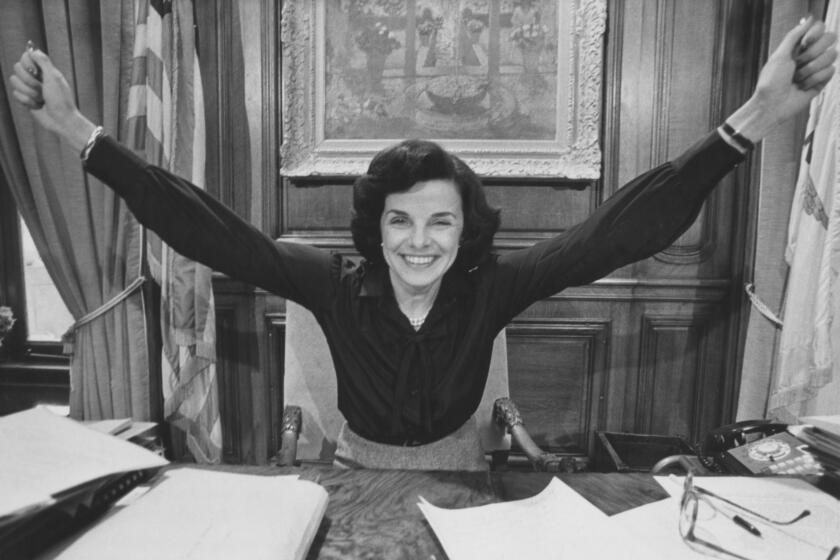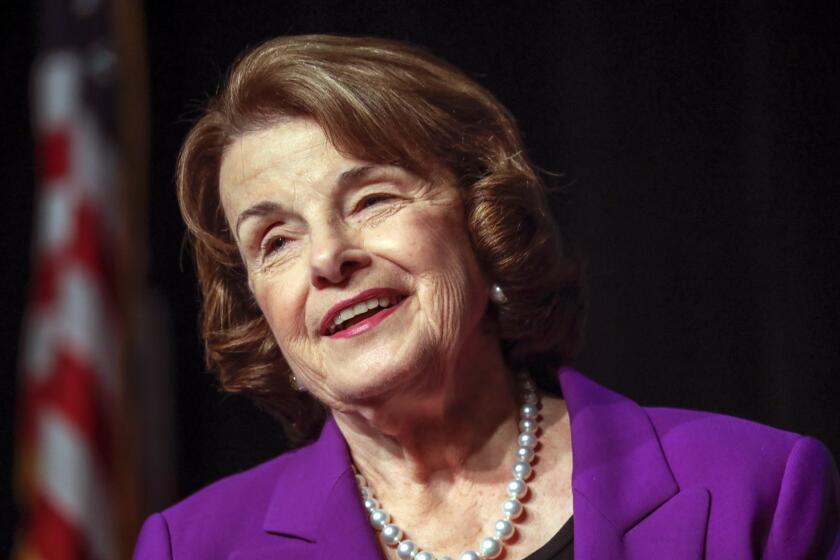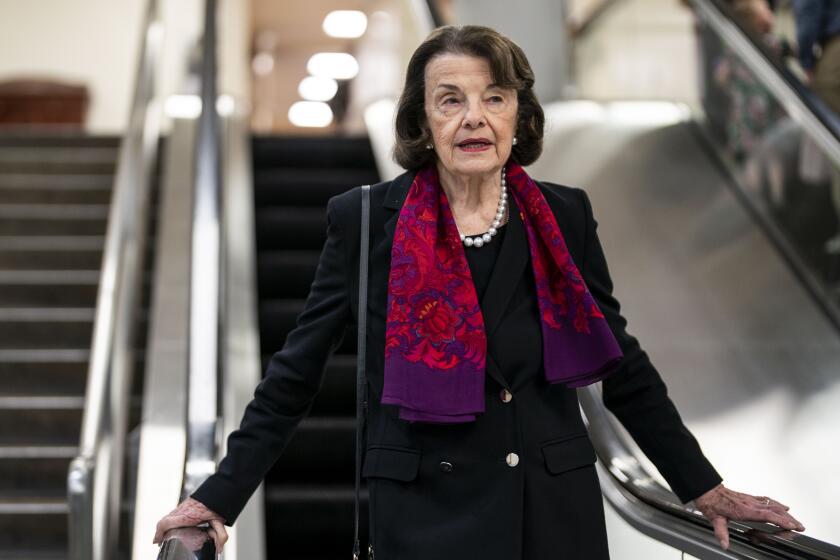Sen. Feinstein makes it official: She will retire at the end of her current term

Dianne Feinstein, 89, California’s longest-serving U.S. senator, announces she will not run for reelection next year.
WASHINGTON — Sen. Dianne Feinstein, California’s longest-serving senator, will not run for reelection next year, marking the end to one of the state’s most storied political careers.
Feinstein said Tuesday she plans to remain in office through the end of her term.
“I am announcing today I will not run for reelection in 2024, but intend to accomplish as much for California as I can through the end of next year when my term ends,” Feinstein said in a statement.
Feinstein’s retirement comes as little surprise given her age — at 89 she is the oldest senator — and the lack of fundraising she has done in preparation for another costly campaign.
Key moments in Dianne Feinstein’s boundary-breaking career in California politics
What’s more, the race to fill her coveted Senate seat has already begun. Her silence until now created an awkward vacuum as fellow Democrats tiptoed around her formidable legacy while making clear they wanted her job.
Democratic Reps. Katie Porter of Irvine and Adam B. Schiff of Burbank didn’t wait for Feinstein to make it official before launching Senate campaigns in recent weeks. Another Democrat, Rep. Barbara Lee of Oakland, is expected to jump into the contest as well.
Feinstein told The Times in December that she did not expect to make a final decision on reelection until the spring. But pressure mounted as the race to replace her moved forward anyway.
“This time has come,” Feinstein told reporters outside the Senate chamber Tuesday. “There’s time for all things under the sun.”
Sen. Dianne Feinstein had announced that she would not seek reelection before her death. Here are the announced and potential candidates for her seat.
The White House was alerted to Feinstein’s plan earlier Tuesday, according to a Feinstein aide.
“I’ve served with more U.S. senators than just about anyone,” President Biden said in a statement. “I can honestly say that Dianne Feinstein is one of the very best.”
Feinstein will leave behind a Senate legacy that includes key roles in enacting the nation’s only assault weapons ban, releasing documentation of the CIA’s use of torture despite strong pushback from the intelligence community, and blazing a trail for female senators.
During her first Senate campaign in 1992, there were only two female senators. Today there are 25. In November, she became the longest-serving female senator in U.S. history.
Shortly after making her plans official, Feinstein gave “a very heartwarming and a teary address” to her fellow Senate Democrats in a closed-door lunch, said Senate Majority Leader Charles E. Schumer (D-N.Y.), adding that she spoke of her late husband, Richard Blum, who died last year.
Schumer said she was greeted with a standing ovation that lasted “minutes and minutes and minutes,” and demonstrated the “love that our caucus — and our country — have” for Feinstein.
“She was the leader on so many different issues: assault weapons, the environment, women’s rights,” Schumer said. “She had passion that accompanied her detailed knowledge of the facts.”
Schumer was one of many fellow Democrats who paid tribute to her political career.
“You can’t tell the story of California politics — or the story of American politics — without the trailblazing career of Dianne Feinstein,” Sen. Alex Padilla (D-Calif.) said.
Former House Speaker Nancy Pelosi (D-San Francisco) called Feinstein a “titan in the United States Senate, with a record that stands among the finest in history.”
California Gov. Gavin Newsom called Feinstein “a powerful champion for California and California values on the national stage for three decades.”
Feinstein indicated Tuesday that she hopes to build on that work before leaving Washington.
Dianne Feinstein died at 90 as one of the most important political figures in California’s history.
“I campaigned in 2018 on several priorities for California and the nation: preventing and combating wildfires, mitigating the effects of record-setting drought, responding to the homelessness crisis and ensuring all Americans have access to affordable, high-quality healthcare,” she said in her statement.
Feinstein had long swatted back speculation that she would step down before the end of her term.
Newsom fueled such talk in 2021 when he said in an interview that he would name a Black woman to the job if Feinstein were to step down.
In recent years, Feinstein faced mounting criticism that she was not up for the demanding job of a senator.
She faced scrutiny at times over confused comments she made to reporters, and for her handling of the confirmation hearings of former President Trump’s Supreme Court nominees Brett M. Kavanaugh and Amy Coney Barrett, when she was the top Democrat on the Judiciary Committee.
Sen. Dianne Feinstein deserves a graceful exit, and would be wise to step down after her current term ends. California Reps. Adam Schiff and Katie Porter seem to have the best chance to replace her in the senate.
At the end of Barrett’s hearing, Feinstein praised the committee chairman, Sen. Lindsey Graham (R-S.C.), for his handling of the process, rankling Democrats who were trying not to lend legitimacy to the rushed confirmation just days before the 2020 presidential election.
Under pressure from progressives, Feinstein agreed to step down as the top Democrat on the committee, missing the chance to become the first woman to lead that panel after her party took control of the Senate in 2021. The post went to Sen. Richard J. Durbin of Illinois.
This year, she was skipped over for the job of president pro tempore of the Senate, a post that typically goes to the longest-serving senator of the majority party. It would have placed her in the presidential line of succession after House Speaker Kevin McCarthy (R-Bakersfield). Patty Murray (D-Wash.) is the current Senate president pro tempore.
Feinstein repeatedly balked at suggestions that her age prevented her from doing the job effectively.
A centrist whose bipartisanship increasingly appeared to be from a bygone era and often frustrated progressives, Feinstein is almost certain to be replaced by someone more liberal.
Californians have soured on her performance in recent years. Only 30% of the state’s voters approved of her job performance as of early last year, according to a poll conducted by the UC Berkeley Institute of Governmental Studies and co-sponsored by the Los Angeles Times. It marked the lowest job performance rating of her Senate career.
First elected in 1992, the year after Anita Hill’s sexual harassment testimony before an all-male Judiciary Committee shined a spotlight on the lack of female representation in Congress, Feinstein would go on to build a legacy on the panel as well as the Senate Intelligence Committee.
In 1994, with memories of the 1978 slayings of then-San Francisco Mayor George Moscone and Supervisor Harvey Milk in her mind, Feinstein shepherded to enactment the federal assault weapons ban, an issue that has remained a priority to her long after the 10-year ban expired.
Perhaps the defining moment of her policy career was the release of an executive summary of a classified CIA report detailing the agency’s use of torture. For five years she battled the George W. Bush administration, the Obama administration and the intelligence community to release an extensive declassified summary of the CIA’s 6,700-page report on its so-called enhanced interrogation techniques.
After months of haggling over whether the report should be made public, Feinstein released it in late 2014, saying the CIA had engaged in activities that were “a stain on our values and our history.”
The report found that the CIA’s secret detention and interrogation program had produced false confessions and fabricated information. It also concluded that the use of torture had produced no useful intelligence about imminent terrorist attacks.
“History will judge us by our commitment to a just society governed by law and the willingness to face an ugly truth, and say, ‘Never again,’” Feinstein said upon the summary’s release.
Nolan D. McCaskill and Erin B. Logan contributed to this report.
More to Read
Get the L.A. Times Politics newsletter
Deeply reported insights into legislation, politics and policy from Sacramento, Washington and beyond. In your inbox three times per week.
You may occasionally receive promotional content from the Los Angeles Times.















